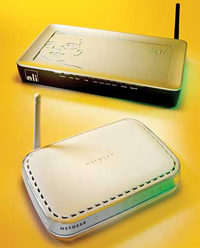Simplify security
New gateways block threats before they reach your network.
Keeping your PC safe is a problem. You need to run anti-virus software, anti-spyware, firewall, fake detection tool bar . and everything above must be updated and tightly managed. This new type of security device promises to simplify this problem and prevent threats before they reach the network.
These smart gateway devices run automatically managed security software. Virus and application formats are encapsulated in the device; and the manufacturer, in addition to selling products, also manages and updates.
But does a device "package" that focuses on such security only replace anti-virus software and firewalls running on the PC? Testing shows that the answer is no. Because these security devices cannot erase all pre-existing infections on the PC or prevent new infections. However, they have more important security features than a standard hardware gateway, as can prevent sloppy users from downloading certain types of malicious software.
Three new options
Tested with 3 security devices: Netgear's WGT624SC Super G Wireless Router for $ 150, Spam Cube costs $ 150, and Eli Security Appliance for $ 200 for TrustEli. Netgear and TrustEli devices have both software to protect, kill viruses, spyware, fake attacks and spam, plus firewalls and web content filtering software. Netgear devices include Trend Micro Home Network Security software for 1 PC. Spam Cube has a more limited function: it only filters spam and scans for e-mail.

Devices of TrustEli (above) and Netgear simplify security.
All additional security functions are not cheap. Besides the price of the device, you will have to pay an additional monthly fee for the software update. Spambox does not charge updates for spam filtering, but the annual virus scanning fee is US $ 52. Netgear charges 99 USD / year (after 1 year of use) to maintain router Security Edition. TrustEli charges USD 120 / year for the update service, you must pay the service fee the first year of purchase.
The installation of gateways is not as easy as other plug-and-play devices. Eli Security Appliance requires that you configure something on the device itself; Then, once the device can connect to the internet, you have to change a little more on the site that is password protected. For example, you can enable virus scanning only through a secure website.
The only difference in setup between this security device from Netgear and any other Netgear gateway device is that it has a web interface to enable or disable security settings. With "Enable security services" enabled, the device's Trend Micro Security software will filter incoming e-mails and block any dangerous websites. Another setting page lets you decide what kind of website you want to block, like gambling, hack and porn sites.
Spam filter box
Spam Cube is the easiest device to set up in all three: just plug one broadband connection and the other into your network gateway. Spam Cube will flag suspicious messages by adding [spam] or [virus] labels to the e-mail subject line. Microsoft Outlook or Outlook Express users can add two "this is spam" buttons and "this is not spam" on the toolbar to "model" Spam Spam. But using this device with other e-mail management programs is more difficult: if the device that has been assigned to valid messages is spam, the only way to fix it is to go to the site setting interface. of equipment.
While these security devices can block some types of malware, such as e-mail attachments, they cannot completely replace anti-virus software and two-way firewalls, such as ZoneAlarm, the software. This monitors activity on each PC. The above security devices cannot remove the virus or spyware from the computer and they cannot prevent the user from copying the infected files onto their device from other devices such as USB drives or CDs.
But by blocking sites that often inflict bad software on your computer, filtering for spam and fake e-mail, these 3 devices can prevent users from falling into the usual traps. For small businesses where employees often work on the web, or at home often have people downloading many things from the network, these devices provide an additional layer of protection.
PC World USA 06/2006